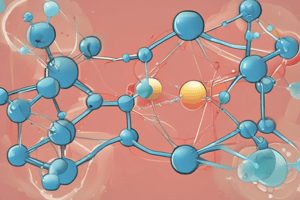Podcast
Questions and Answers
What is the primary focus of physical chemistry?
What is the primary focus of physical chemistry?
- Biological reactions
- Weather patterns
- Evolutionary processes
- Interactions between particles and motion of electrons within atoms (correct)
Which branch of chemistry aims to elucidate the factors governing rates of reactions and equilibrium constants?
Which branch of chemistry aims to elucidate the factors governing rates of reactions and equilibrium constants?
- Analytical chemistry
- Inorganic chemistry
- Physical chemistry (correct)
- Organic chemistry
What is ionic bonding primarily characterized by?
What is ionic bonding primarily characterized by?
- Neutron transfer
- Proton sharing
- Electron sharing
- Electron transfer (correct)
Which type of bonding involves the formation of charged particles called ions?
Which type of bonding involves the formation of charged particles called ions?
Which subfield of physical chemistry deals with the study of energy changes in chemical reactions?
Which subfield of physical chemistry deals with the study of energy changes in chemical reactions?
What type of particles are formed as a result of ionic bonding?
What type of particles are formed as a result of ionic bonding?
What type of attraction is responsible for the formation of ionic compounds?
What type of attraction is responsible for the formation of ionic compounds?
Which elements are generally involved in the formation of ionic bonds?
Which elements are generally involved in the formation of ionic bonds?
What is the role of cations in the formation of ionic bonds?
What is the role of cations in the formation of ionic bonds?
In what structure are ions held together in ionic compounds?
In what structure are ions held together in ionic compounds?
What scientific discipline uses ionic compounds for creating ceramics, electrolytes, and batteries?
What scientific discipline uses ionic compounds for creating ceramics, electrolytes, and batteries?
How does physical chemistry contribute to understanding enzyme catalysis in biology?
How does physical chemistry contribute to understanding enzyme catalysis in biology?
Flashcards are hidden until you start studying
Study Notes
Exploring Chemistry: Physical Chemistry and Ionic Bonds
Physical chemistry and ionic bonding are two fundamental aspects of chemistry that underpin our understanding of the world around us. In this article, we'll delve into the intricacies of these subtopics, shedding light on the concepts that lay the groundwork for many scientific discoveries.
Physical Chemistry
Physical chemistry is the branch of chemistry that focuses on the relationships between energy, matter, and the physical properties of substances. It is concerned with the physical processes that occur during chemical reactions, including the interactions between particles and the motion of electrons within atoms and molecules. Physical chemistry also aims to understand how energy is transferred and transformed during chemical processes, elucidating the factors that govern the rates of reactions, equilibrium, and chemical equilibrium constants.
Physical chemistry encompasses several subfields, including thermodynamics, kinetics, statistical mechanics, and quantum chemistry. These areas of study provide invaluable insights into the relationships between energy, matter, and the behavior of atoms and molecules, which, in turn, lead to a deeper understanding of chemical reactions and processes.
Ionic Bonding
Ionic bonding is one of the primary types of chemical bonding, where electrons are transferred between atoms to form charged particles called ions. In this process, the transfer of electrons results in an electrostatic attraction between oppositely charged ions, leading to the formation of ionic compounds. Ionic bonds are generally formed between elements that have significant differences in electronegativity, such as elements from groups 1 and 2, or from groups 15 to 18, in the periodic table.
The formation of ionic bonds can be explained using the electrostatic model, which depicts the attraction between positively charged cations (ions with a deficit of electrons) and negatively charged anions (ions with an excess of electrons). This attraction results in a three-dimensional lattice structure, where the ions are held together by the electrostatic forces of attraction.
Applications of Physical Chemistry and Ionic Bonding
The principles of physical chemistry and ionic bonding have numerous applications across various scientific disciplines. In materials science, for example, ionic compounds are used to create ceramics, electrolytes, and batteries, while physical chemistry helps in understanding the behavior of these materials under different conditions. In biology, physical chemistry aids in understanding the principles of enzyme catalysis, while ionic bonding is essential to the structure and function of biomolecules, such as proteins and nucleic acids.
Summary
Physical chemistry and ionic bonding are fundamental subtopics of chemistry that provide a comprehensive understanding of the relationships between energy, matter, and the behavior of atoms and molecules. These areas of study have numerous applications across various scientific disciplines and continue to inform our understanding of the natural world and drive innovation in chemistry and related fields. By delving into these subtopics, we gain valuable insights into the fundamental principles that govern the chemical behavior of matter.
Studying That Suits You
Use AI to generate personalized quizzes and flashcards to suit your learning preferences.




